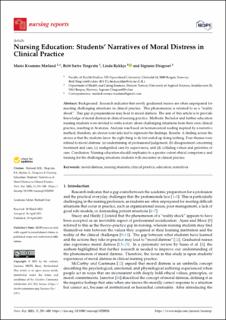Nursing Education: Students’ Narratives of Moral Distress in Clinical Practice
Peer reviewed, Journal article
Published version
Permanent lenke
https://hdl.handle.net/11250/2753738Utgivelsesdato
2021Metadata
Vis full innførselSamlinger
- Artikler / Articles [1185]
- Publikasjoner fra CRIStin [1132]
Sammendrag
Background: Research indicates that newly graduated nurses are often unprepared for meeting challenging situations in clinical practice. This phenomenon is referred to as a “reality shock”. This gap in preparedness may lead to moral distress. The aim of this article is to provide knowledge of moral distress in clinical nursing practice. Methods: Bachelor and further education nursing students were invited to write a story about challenging situations from their own clinical practice, resulting in 36 stories. Analysis was based on hermeneutical reading inspired by a narrative method; therefore, six stories were selected to represent the findings. Results: A finding across the stories is that the students knew the right thing to do but ended up doing nothing. Four themes were related to moral distress: (a) undermining of professional judgement, (b) disagreement concerning treatment and care, (c) undignified care by supervisors, and (d) colliding values and priorities of care. Conclusion: Nursing education should emphasize to a greater extent ethical competency and training for the challenging situations students will encounter in clinical practice.
